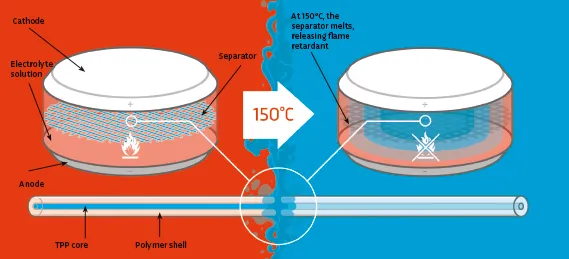Lithium ion batteries contain a highly flammable electrolyte solution that allows ions to move from anode to cathode and back through a separator. However, if there is an internal short circuit, heat can build up, and the battery can potentially burst into flame.

Stanford researchers have developed a new separator made of polymer that contains triphenyl phosphate (TPP), which is flame retardant. If temperatures reach 150°C, the polymer shell melts, releasing the TPP to prevent combustion.
Subscribe to BBC Focus magazine for fascinating new Q&As every month and follow @sciencefocusQA on Twitter for your daily dose of fun science facts.
